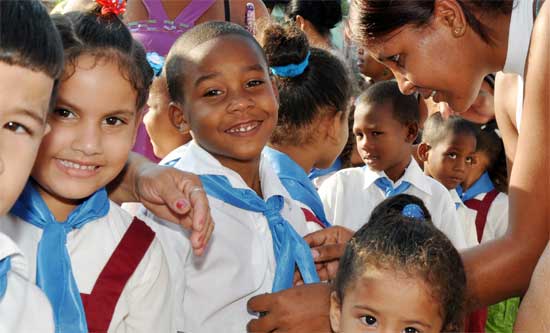
In Britain the rate of illiteracy is rising and education continues to be systematically destroyed by the rise in free schools and academies that are aimed at diverting public finances into private hands. In contrast, socialist Cuba is set to further improve and expand its education system, devoting 13% of its national budget to education, the highest in the world.
On 1 September, Cuba’s thousands of education centres opened their doors to 1.8 million students from primary to pre-university level. Many of these students will be attending Cuba’s professional-technical colleges. These schools equip students with the appropriate skills and vocational training necessary for the development of Cuba’s industry and productivity, and this academic year they will offer some twenty new areas of study. This school year will also see all pre-university high schools in Cuba being equipped with chemistry, physics and biology laboratories.
While many schools are already opening early in the mornings and closing late in the evenings to provide free childcare for those parents who need it, this academic year will see 3,000 new openings in pre-school day care centres as well as an increase to 75,900 registered boarding students. With free school meals and uniforms, Cuban socialism is ensuring a positive and supported start to the free education of all children.
The World Bank’s latest findings reveal Cuba’s teaching standards as ‘exceptional in its strong emphasis on teamwork and exchange of experience among teachers’, highlighting the Cuban model as ‘exemplary’ and the best in Latin America.* The focus on teaching is clear in Cuba: with its many teacher training high schools and universities preparing students to become professors and educators. Jose Ramon Fernandez Alvarez, advisor to President Raul Castro, recently recognised the teacher figure as the ‘principal element of any educational system’.
Cuba also ensures that children with disabilities are supported by its education system, and this year the ‘14 Junio’ special education school in Guantanamo celebrated its inauguration. The school will serve children with visual and auditory disabilities. Alongside such schools, children whose disabilities keep them at home, or children with temporary illness or injury, are taught by mobile teachers who visit them where they live. Isabel Moya Richard, a journalism professor at the University of Havana, received this special teaching for her injured daughter, and congratulates Cuba’s educational system on how it deals with disability: ‘whatever disabilities a person has, they all have the right to education. They all have special educational plans. The empowerment of people with disability has to do with the right to educate themselves and enhance their self-esteem.’
The sophisticated health care system in Cuba is a product of such dedicated educational structures, and this year the island’s capital, Havana, will host the Second International Conference on Medical Education for the 21st Century, where the role of medical colleges and health sciences for the welfare of the people will be discussed. Iliana Morales, director of science and technology at the Cuban Ministry of Public Health, explained that the main objective of the forum is to evaluate the way graduates from medical universities can contribute to the solution of major health problems worldwide. She also observed that Cuba has 14 medical universities and a faculty of over 37,000 scientific teachers.
With these advancements and improvements in education, Cuba proves that despite the crushing blockade which to date has cost an estimated $116.88 billion, Cuba can continue to progress as a nation by placing education at the forefront of its socialist agenda.
Harriet Taylor
* World Bank Group Latin American Development forum: ‘Great teachers: How to raise student learning in Latin America and the Caribbean’, Barbara Bruns and Javier Luque, 2014
Fight Racism! Fight Imperialism! 241 October/November 2014




